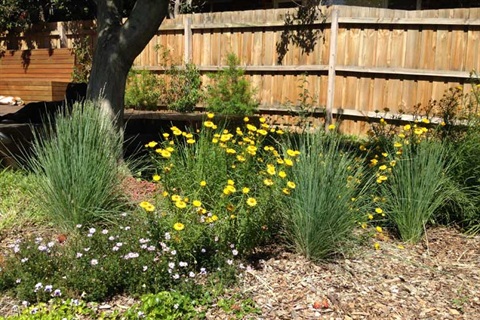Sustainable gardens

Learn how to create a sustainable garden whether it is by growing your own vegetables, planting native species or composting your food scraps.
Compost your food scraps
Find out how you can compost your food scraps through Council's discounted compost bin and worm farm program.
Growing food at home
Producing your own fruit and vegetables at home is a great way to save money and reduce your dependence on food transported from far away.
Don’t have a big yard? Don’t worry - you can still be productive in small spaces such as balconies through use of pots and wall installations. You can find planting and care information for a variety of fruit and vegetables at Gardening Australia and Sustainable Gardening Australia. Using a planting calendar will also help you to figure out what is the best time of year to plant your favourite plants.
Gardens for Harvest
The Gardens for Harvest booklet provides practical advice on how to grow your own produce at home; from designing and planning your garden, to planting and harvesting your own fresh fruit and vegetables.
Growing your own food is a great way to get fresh air and exercise while providing fresh and healthy food for your family. It also helps to reduce food packaging, transportation and chemical use, which is all good for the planet.
The Gardens for Harvest Booklet also has the contact details and locations of Community Gardens and Garden Clubs where you can meet new people and share knowledge and experiences.
Get your Gardens for Harvest booklet:
Gardening with indigenous and native plants
Indigenous Biodiversity
Interested in the types of native plants around Monash?
Here’s a comprehensive list of plants with links to key information about each species: Indigenous Species in Monash
Monash Gardens for Wildlife
Planting with native or indigenous plants has benefits like:
- Being perfectly suited to our local soils and climate
- Requiring little maintenance to keep them looking healthy and neat
- Being able to withstand Melbourne’s hot, dry summers and long dry periods with little or no watering
- Attracting and provide food and shelter for native wildlife
- Saving you money and water
For more tips on gardening with indigenous and native plants and local nurseries, refer to the Monash Gardens for Wildlife(PDF, 6MB) publication.
To find out more about our program, visit Monash Gardens for Wildlife
Nature strips
A nature strip is an area of public land between the property boundary and the kerb, excluding any public pavement. In most cases a nature strip is grassed, but in the circumstances provided in the guidelines, a nature strip can be modified by an alternative landscape treatment.
A permit is required to undertake excavation and/or landscape works on nature strips.
Please read the Planting on Nature Strips Guidelines.
Weeds
Weeds are plants that invade and thrive in environments in which they do not naturally occur. These plants alter the natural balance in the local ecology and threaten biodiversity by competing with indigenous plants that are a valuable food source for native birds and fauna.
Declared noxious, weeds are plants that have been proclaimed under legislation, which requires the landholder to control or eradicate them.
More information on weed identification, control measures and appropriate herbicides: Weeds section.
Keeping chickens in your backyard
A Council Local Law limits the number of animals permitted to be kept on properties in Monash. The following rules apply:
- Roosters are prohibited
- Limit of up to 5 poultry birds
You must also ensure that the animals can access food and water and provided with clean and sufficient space. Find out more about Animal Regulations in Monash.
Keeping chickens requires a bit of planning, including choice of breed, enclosure and feed, and how to keep your birds healthy. For more information, please see Keeping backyard chickens.